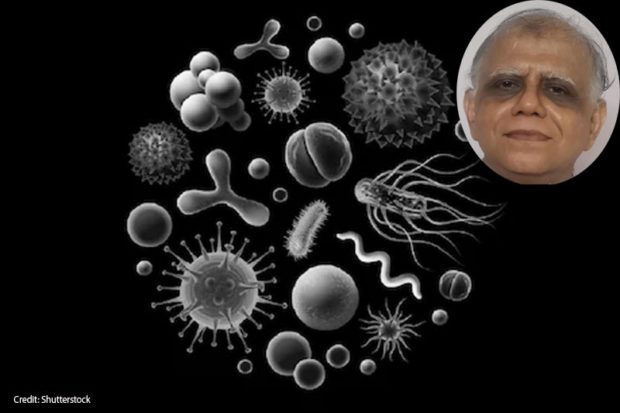
Kundapura’s B Srikantha Annappa Pai is the brains behind Antidote to black fungus
Team Udayavani, May 26, 2021, 10:50 AM IST

Kundapura: As India is witnessing a rapid rise in the cases of Mucormycosis or black fungus, the demand for Liposomal Amphotericin B (LaMB) has surged.
Liposomal Amphotericin B is a lifesaving medication that helps patients overcome this deadly fungal disease and the man who invented this is our very own Kundapura Taluk’s B Srikantha Annappa Pai.
Annappa Pai had developed the medicine back in 2010-11.
Born in Gangolli village of Kundapura Taluk, Pai got a degree of Bachelors in Pharma from the Government Pharmacy College in Bengaluru and completed his post-graduation from Manipal.
As job opportunities in Karnataka weren’t great at that time, Pai decided to move to Mumbai, where he stayed with his sister and started hunting for work. After several interviews, he landed a job with Bharat Serums and served the company for 17 long years.
The patent to the drug for the treatment of mucormycosis was originally owned American company and expired in 2008.
As India didn’t have the necessary technology to create an alternative and with no SoP (standard-operating procedure) it took two-year-long research and development for his team to finally come up with an efficient product. The drug was finally released in 2010-11.
Mucormycosis is a deadly and aggressive fungal infection that causes blackening or discoloration over the nose, one-sided facial swelling, headache, nasal or sinus congestion, fever, blurred or double vision, chest pain, breathing difficulties, and coughing blood. The disease has a close link to diabetes and conditions which compromise the immune system of the human body.
Mucormycosis has a mortality rate of 54%, which can vary depending on the condition of the patients and the body part affected, data from the US Centers for Disease Control and Prevention shows. Most states in India have already declared black fungus as an epidemic.
All you need to know about the fungal infection
Symptoms:
- Pain and redness around eyes and/or nose
- Fever
- Headache
- Coughing
- Shortness of breath
- Blood in vomit
- Altered mental status
Who is most at risk?
- Uncontrolled diabetes
- Immunosuppression by steroids
- Prolonged ICU stay
- Comorbidities post-transplant/malignancy
- Kidney disease
- Cancer
- Heart disease
How to prevent the infection
- Use a mask if visiting a dusty construction site
- Wear shoes, long trousers, long sleeve shirts and gloves while handling soil.
- Maintain personal hygiene
List of do’s & don’ts by ICMR
- Control hyperglycemia
- Monitor blood glucose level post- COVID-19 discharge
- Use steroids judiciously – correct timing, dose and duration
- Use clean, sterile water for humidifiers during oxygen therapy
- Use antibiotics/antifungals judiciously
- Do not miss warning signs and symptoms
- Do not consider all cases with blocked nose to be bacterial sinusitis, especially in the context of immunosuppressors and/or COVID-19 patients on immunomodulators
- Do not hesitate to seek aggressive interventions
- Tests like KOH staining, microscopy, culture, MALDI-TOF can be done to detect fungal aetiology
- Don’t lose crucial time by hesitating to initiate treatment
Udayavani is now on Telegram. Click here to join our channel and stay updated with the latest news.
Top News

Related Articles More

Cabinet expansion in Karnataka? Aspirants lobby intensely

‘Allow teachers to discipline students’: Letter to CM Siddaramaiah

Eligible families won’t be inconvenienced with BPL card revision: Karnataka minister Muniyappa

Karnataka: BJP to begin official campaign on Waqf issue from December 4

Geethartha Chinthane 105: Shoka and Dukha are not same
MUST WATCH
Latest Additions

Sensex, Nifty climb in early trade amid fresh foreign fund inflows

Amur falcon bird radio tagged in Manipur reaches Kenya

Battle royal at Udaipur palace after BJP’s Vishvaraj Singh denied entry over family feud

5 killed as lorry runs over people sleeping on roadside in Kerala’s Thrissur

Cabinet expansion in Karnataka? Aspirants lobby intensely
Thanks for visiting Udayavani
You seem to have an Ad Blocker on.
To continue reading, please turn it off or whitelist Udayavani.





















